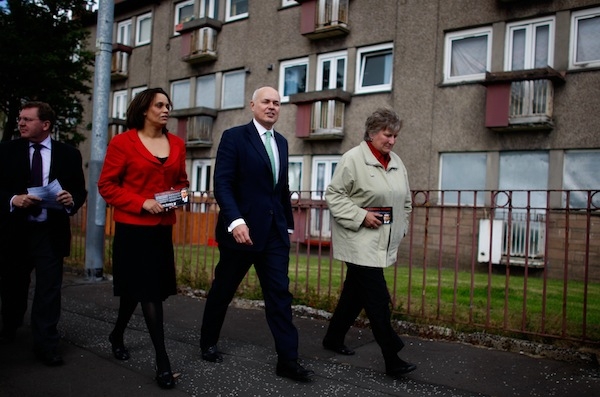It’s tough being a supporter of this coalition government. Mishap and omnishambles have come to characterise its first three years in office – but you can almost forgive all of this given the progress being made on education and welfare. Reforming the latter is the toughest mission in politics, and another phase of that reform comes into effect today.
But here’s the thing: the welfare reform is not causing mass outrage. Of course, Polly Toynbee is furious – but to the bafflement of the chattering class, the masses seem to think the reform is long overdue. Study after study confirms this. There was that YouGov/Prospect study suggesting that three in four people (and a majority of Labour voters) think that Britain spends too much on welfare. In fact, popular opinion seems even more hawkish that the average Tory MP. You’ll struggle to hear any self-respecting MP using the word “scroungers,” for example, but two in five think that applies to a significant minority of welfare claimants. The Joseph Rowntree Foundation has found that attitudes to those on welfare are even more negative than attitudes towards the rich.
Given that the average worker is having to make do with 1pc increase in salary, is it really cruel to impose a 1pc rise to welfare payments? Especially after benefits rose three times faster that salaries last year? It’s no surprise that more a YouGov/Sunday Times poll found the 1pc rise to welfare enjoys a 10-point lead in support. Ironically, welfare reform is one of the most popular things this government is doing. And it’s never more popular than amongst those on low wages, who share housing estates with the welfare-dependent and can see the injustice. You need to look at Britain through the columns of a spreadsheet not to see the wider point of what’s going on.
If the state paves the road to welfare dependency, we ought not to be surprised that so many millions walk down it. Iain Duncan Smith is trying to pave a new road, one that leads to prosperity via work. This reform does mean restricting certain welfare payments, to make sure work is – by comparison – the more attractive option. Much more can be done (I’d advocate an emergency tax cut for the low-paid). If the welfare cuts increase the incentive to work (remember, employment in Britain is at a record high right now – there are jobs to take) then it may be sustainable. Writing larger welfare cheques, or saying “let them eat tax credits” is not sustainable. Nor is it compassionate, as Labour proved during the boom years.
I suspect this is why so many on the left are so angry. IDS is carrying out his reforms not in the name of economic efficiency but in the name of social justice. He does so plausibly and, by and large, with public support. As Christian Guy observed on Coffee House yesterday, this is not about saving money. It’s about saving lives – and in a way that Labour failed to do when it has the time and money. A million working-age people were on benefits during every one of Labour’s 13 years and that’s far worse than a waste of money. It’s a scandalous waste of human potential.
So yes, today’s welfare cuts are tough. But public opinion regards them as fair. For 13 years, Labour fought poverty. Poverty won. David Cameron can say that the task of ending poverty now falls to the modern Conservatives.
But the more reform-minded Labour supporters will know that this is not, really, party political. IDS stands in a tradition of Labour reformers – John Hutton and James Purnell to name just two. I suspect Labour target voters will agree with IDS. This is an area where the unions, and the Labour leadership, have found themselves on the wrong side of public opinion.
UPDATE: Here’s IDS being interviewed on BBC Radio Four







Comments